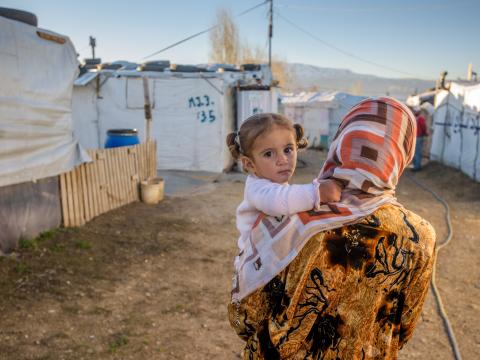Addressing the Massacre of the Innocents

The greatness of a people is not seen in our monuments, our accomplishments, or our prosperity. It’s most honestly visible in how we treat the vulnerable, the powerless, and especially children. Tragically, children are the first to suffer under the abuse of power, the distrust of warring factions, the ambition of people, and the greed of human hearts. It’s common at Christmas time to reflect on the massacre of the innocents after Jesus’ birth. During Lent we are invited to reflect on Jesus’ solidarity with and work to redeem the massacre of children throughout history—up to today.
More than two thousand years after Jesus' refugee journey, we still have millions of children going through this trauma of dislocation, loss of near and dear ones and even fear of death.
One of the most poignant chapels we’ve ever visited is at Bethlehem University in Palestine. The Chapel of the Divine Child celebrates Christ’s birth in Bethlehem, but it does this through commemorating the massacre of the innocents. “When Herod saw that he had been tricked by the wise men, he was infuriated, and he sent and killed all the children in and around Bethlehem” (Matt 2:16). The murals of the chapel portray both the agony and the glory of children around the world who’ve been unjustly killed at the hands of those who are tyrants and those who are indifferent.
But that’s not all the chapel conveys. The chapel also portrays that the Divine Child, Immanuel, was born with the stigma of “illegitimacy,” without a home, without possessions except the gifts of strangers, and without visa or passport, sneaking (led by God!) as a political refugee with his family into another country for survival (Matt 2:13-14).
This Lent, as we journey with Jesus toward the Cross, we invite the Spirit to work through us to protect, encourage, provide for, and honor children. As we care for “the least of these” we care for Jesus (Matt 25:40).
More than two thousand years after Jesus' refugee journey, we still have millions of children going through this trauma of dislocation, loss of near and dear ones and even fear of death. They lose their homeland, their childhoods and most of all their dreams. See and hear some of these children here:
This chapel reminds us that the foot of the Cross rests not on the stones of Jerusalem’s Golgotha, but in the straw of Bethlehem’s Manger. From the moment our Lord bore our flesh, he began to bear all human sin and evil, and to do the work of humankind’s redemption. He suffers with, weeps over, carries, and redeems the worst that people inflict on creation and one another—especially on children.
This Lent, as we journey with Jesus toward the Cross, we invite the Spirit to work through us to protect, encourage, provide for, and honor children. As we care for “the least of these” we care for Jesus (Matt 25:40). As we care for children, we are drawn more deeply into the life of God, and we give witness to the God who bears and redeems all suffering and evil.
This Lent we have the unfortunate situation where we are also looking at the 6th year of the war in Syria, war that seems endless. A war that has displaced more than four out of ten children from Syria. Of the 4.8 million registered Syrian refugees, more than half are children.
Apart from responding to the challenges of living as refugees in various communities and nations outside Syria, World Vision's recently launched "It takes a world...." campaign to end violence against children seeks to focus attention of the international community on these children - bring an end to the refugee crisis.
It does take a world fearlessly raising their voice to end this needless violence being brought on the children of Syria.
This blog was contributed by Dr. Tim and Kelly Dearborn. Dr .Tim Dearborn, Former WV Partnership Leader: Christian Commitments. PhD University of Aberdeen. He and his wife are based in the greater Seattle area.